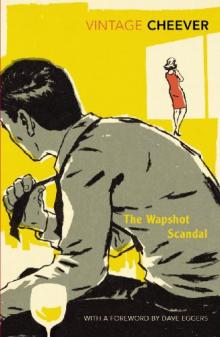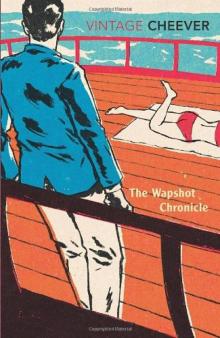- Home
- John Cheever
The Stories of John Cheever Page 2
The Stories of John Cheever Read online
Page 2
And it was unfortunate, in a way, that Mother should have picked that night to get drunk. It’s her privilege, and she doesn’t get drunk often, and fortunately she wasn’t bellicose, but we were all conscious of what was happening. As she quietly drank her gin, she seemed sadly to be parting from us; she seemed to be in the throes of travel.
Then her mood changed from travel to injury, and the few remarks she made were petulant and irrelevant. When her glass was nearly empty, she stared angrily at the dark air in front of her nose, moving her head a little, like a fighter. I knew that there was not room in her mind then for all the injuries that were crowding into it. Her children were stupid, her husband was drowned, her servants were thieves, and the chair she sat in was uncomfortable. Suddenly she put down her empty glass and interrupted Chaddy, who was talking about baseball. “I know one thing,” she said hoarsely. “I know that if there is an afterlife, I’m going to have a very different kind of family. I’m going to have nothing but fabulously rich, witty, and enchanting children.” She got up and, starting for the door, nearly fell. Chaddy caught her and helped her up the stairs. I could hear their tender goodnights, and then Chaddy came back. I thought that Lawrence by now would be tired from his journey and his return, but he remained on the terrace, as if he were waiting to see the final malfeasance, and the rest of us left him there and went swimming in the dark.
When I woke the next morning, or half woke, I could hear the sound of someone rolling the tennis court. It is a fainter and a deeper sound than the iron buoy bells off the pointan unrhythmic iron chimingthat belongs in my mind to the beginnings of a summer day, a good portent. When I went downstairs, Lawrence’s two kids were in the living room, dressed in ornate cowboy suits. They are frightened and skinny children. They told me their father was rolling the tennis court but that they did not want to go out because they had seen a snake under the doorstep. I explained to them that their cousinsall the other childrenate breakfast in the kitchen and that they’d better run along in there. At this announcement, the boy began to cry. Then his sister joined him. They cried as if to go in the kitchen and eat would destroy their most precious rights. I told them to sit down with me. Lawrence came in, and I asked him if he wanted to play some tennis. He said no, thanks, although he thought he might play some singles with Chaddy. He was in the right here, because both he and Chaddy play better tennis than I, and he did play some singles with Chaddy after breakfast, but later on, when the others came down to play family doubles, Lawrence disappeared. This made me crossunreasonably so, I supposebut we play darned interesting family doubles and he could have played in a set for the sake of courtesy.
Late in the morning, when I came up from the court alone, I saw Tifty on the terrace, prying up a shingle from the wall with his jackknife. “What’s the matter, Lawrence?” I said. “Termites?” There are termites in the wood and they’ve given us a lot of trouble.
He pointed out to me, at the base of each row of shingles, a faint blue line of carpenter’s chalk. “This house is about twenty-two years old,” he said. “These shingles are about two hundred years old. Dad must have bought shingles from all the farms around here when he built the place, to make it look venerable. You can still see the carpenter’s chalk put down where these antiques were nailed into place.”
It was true about the shingles, although I had forgotten it. When the house was built, our father, or his architect, had ordered it covered with lichened and weather-beaten shingles. I didn’t follow Lawrence’s reasons for thinking that this was scandalous.
“And look at these doors,” Lawrence said. “Look at these doors and window frames.” I followed him over to a big Dutch door that opens onto the terrace and looked at it. It was a relatively new door, but someone had worked hard to conceal its newness. The surface had been deeply scored with some metal implement, and white paint had been rubbed into the incisions to imitate brine, lichen, and weather rot. “Imagine spending thousands of dollars to make a sound house look like a wreck,” Lawrence said. “Imagine the frame of mind this implies. Imagine wanting to live so much in the past that you’ll pay men carpenters’ wages to disfigure your front door.” Then I remembered Lawrence’s sensitivity to time and his sentiments and opinions about our feelings for the past. I had heard him say, years ago, that we and our friends and our part of the nation, finding ourselves unable to cope with the problems of the present, had, like a wretched adult, turned back to what we supposed was a happier and a simpler time, and that our taste for reconstruction and candlelight was a measure of this irremediable failure. The faint blue line of chalk had reminded him of these ideas, the scarified door had reinforced them, and now clue after clue presented itself to himthe stern light at the door, the bulk of the chimney, the width of the floorboards and the pieces set into them to resemble pegs. While Lawrence was lecturing me on these frailties, the others came up from the court. As soon as Mother saw Lawrence, she responded, and I saw that there was little hope of any rapport between the matriarch and the changeling. She took Chaddy’s arm. “Let’s go swimming and have Martinis on the beach,” she said. “Let’s have a fabulous morning.”
The sea that morning was a solid color, like verd stone. Everyone went to the beach but Tifty and Ruth. “I don’t mind him,” Mother said. She was excited, and she tipped her glass and spilled some gin into the sand. “I don’t mind him. It doesn’t matter to me how rude and horrid and gloomy he is, but what I can’t bear are the faces of his wretched little children, those fabulously unhappy little children.” With the height of the cliff between us, everyone talked wrathfully about Lawrence; about how he had grown worse instead of better, how unlike the rest of us he was, how he endeavored to spoil every pleasure. We drank our gin; the abuse seemed to reach a crescendo, and then, one by one, we went swimming in the solid green water. But when we came out no one mentioned Lawrence unkindly; the line of abusive conversation had been cut, as if swimming had the cleansing force claimed for baptism. We dried our hands and lighted cigarettes, and if Lawrence was mentioned, it was only to suggest, kindly, something that might please him. Wouldn’t he like to sail to Barin’s cove, or go fishing?
And now I remember that while Lawrence was visiting us, we went swimming oftener than we usually do, and I think there was a reason for this. When the irritability that accumulated as a result of his company began to lessen our patience, not only with Lawrence but with one another, we would all go swimming and shed our animus in the cold water. I can see the family now, smarting from Lawrence’s rebukes as they sat on the sand, and I can see them wading and diving and surface-diving and hear in their voices the restoration of patience and the rediscovery of inexhaustible good will. If Lawrence noticed this changethis illusion of purificationI suppose that he would have found in the vocabulary of psychiatry, or the mythology of the Atlantic, some circumspect name for it, but I don’t think he noticed the change. He neglected to name the curative powers of the open sea, but it was one of the few chances for diminution that he missed.
The cook we had that year was a Polish woman named Anna Ostrovick, a summer cook. She was first-ratea big, fat, hearty, industrious woman who took her work seriously. She liked to cook and to have the food she cooked appreciated and eaten, and whenever we saw her, she always urged us to eat. She cooked hot bread-crescents and brioches for breakfast two or three times a week, and she would bring these into the dining room herself and say, “Eat, eat, eat!” When the maid took the serving dishes back into the pantry, we could sometimes hear Anna, who was standing there, say, “Good! They eat.” She fed the garbage man, the milkman, and the gardener. “Eat!” she told them. “Eat, eat!” On Thursday afternoons, she went to the movies with the maid, but she didn’t enjoy the movies, because the actors were all so thin. She would sit in the dark theatre for an hour and a half watching the screen anxiously for the appearance of someone who had enjoyed his food. Bette Davis merely left with Anna the impression of a woman who has not eaten well. “Th
ey are all so skinny,” she would say when she left the movies. In the evenings, after she had gorged all of us, and washed the pots and pans, she would collect the table scraps and go out to feed the creation. We had a few chickens that year, and although they would have roosted by then, she would dump food into their troughs and urge the sleeping fowl to eat. She fed the songbirds in the orchard and the chipmunks in the yard. Her appearance at the edge of the garden and her urgent voicewe could hear her calling “Eat, eat, eat”had become, like the sunset gun at the boat club and the passage of light from Cape Heron, attached to that hour. “Eat, eat, eat,” we could hear Anna say. “Eat, eat…” Then it would be dark.
When Lawrence had been there three days, Anna called me into the kitchen. “You tell your mother,” she said, “that he doesn’t come into my kitchen. If he comes into my kitchen all the time, I go. He is always coming into my kitchen to tell me what a sad woman I am. He is always telling me that I work too hard and that I don’t get paid enough and that I should belong to a union with vacations. Ha! He is so skinny but he is always coming into my kitchen when I am busy to pity me, but I am as good as him, I am as good as anybody, and I do not have to have people like that getting into my way all the time and feeling sorry for me. I am a famous and a wonderful cook and I have jobs everywhere and the only reason I come here to work this summer is because I was never before on an island, but I can have other jobs tomorrow, and if he is always coming into my kitchen to pity me, you tell your mother I am going. I am as good as anybody and I do not have to have that skinny all the time telling how poor I am.”
I was pleased to find that the cook was on our side, but I felt that the situation was delicate. If Mother asked Lawrence to stay out of the kitchen, he would make a grievance out of the request. He could make a grievance out of anything, and it sometimes seemed that as he sat darkly at the dinner table, every word of disparagement, wherever it was aimed, came home to him. I didn’t mention the cook’s complaint to anyone, but somehow there wasn’t any more trouble from that quarter.
The next cause for contention that I had from Lawrence came over our backgammon games.
When we are at Laud’s Head, we play a lot of backgammon. At eight o’clock, after we have drunk our coffee, we usually get out the board. In a way, it is one of our pleasantest hours. The lamps in the room are still unlighted, Anna can be seen in the dark garden, and in the sky above her head there are continents of shadow and fire. Mother turns on the light and rattles the dice as a signal. We usually play three games apiece, each with the others. We play for money, and you can win or lose a hundred dollars on a game, but the stakes are usually much lower. I think that Lawrence used to playI can’t rememberbut he doesn’t play any more. He doesn’t gamble. This is not because he is poor or because he has any principles about gambling but because he thinks the game is foolish and a waste of time. He was ready enough, however, to waste his time watching the rest of us play. Night after night, when the game began, he pulled a chair up beside the board, and watched the checkers and the dice. His expression was scornful, and yet he watched carefully. I wondered why he watched us night after night, and, through watching his face, I think that I may have found out.
Lawrence doesn’t gamble, so he can’t understand the excitement of winning and losing money. He has forgotten how to play the game, I think, so that its complex odds can’t interest him. His observations were bound to include the facts that backgammon is an idle game and a game of chance, and that the board, marked with points, was a symbol of our worthlessness. And since he doesn’t understand gambling or the odds of the game, I thought that what interested him must be the members of his family. One night when I was playing with OdetteI had won thirty-seven dollars from Mother and ChaddyI think I saw what was going on in his mind.
Odette has black hair and black eyes. She is careful never to expose her white skin to the sun for long, so the striking contrast of blackness and pallor is not changed in the summer. She needs and deserves admirationit is the element that contents herand she will flirt, unseriously, with any man. Her shoulders were bare that night, her dress was cut to show the division of her breasts and to show her breasts when she leaned over the board to play. She kept losing and flirting and making her losses seem like a part of the flirtation. Chaddy was in the other room. She lost three games, and when the third game ended, she fell back on the sofa and, looking at me squarely, said something about going out on the dunes to settle the score. Lawrence heard her. I looked at Lawrence. He seemed shocked and gratified at the same time, as if he had suspected all along that we were not playing for anything so insubstantial as money. I may be wrong, of course, but I think that Lawrence felt that in watching our backgammon he was observing the progress of a mordant tragedy in which the money we won and lost served as a symbol for more vital forfeits. It is like Lawrence to try to read significance and finality into every gesture that we make, and it is certain of Lawrence that when he finds the inner logic to our conduct, it will be sordid.
Chaddy came in to play with me. Chaddy and I have never liked to lose to each other. When we were younger, we used to be forbidden to play games together, because they always ended in a fight. We think we know each other’s mettle intimately. I think he is prudent; he thinks I am foolish. There is always bad blood when we play anythingtennis or backgammon or softball or bridgeand it does seem at times as if we were playing for the possession of each other’s liberties. When I lose to Chaddy, I can’t sleep. All this is only half the truth of our competitive relationship, but it was the half-truth that would be discernible to Lawrence, and his presence at the table made me so self-conscious that I lost two games. I tried not to seem angry when I got up from the board. Lawrence was watching me. I went out onto the terrace to suffer there in the dark the anger I always feel when I lose to Chaddy.
When I came back into the room, Chaddy and Mother were playing. Lawrence was still watching. By his lights, Odette had lost her virtue to me, I had lost my self-esteem to Chaddy, and now I wondered what he saw in the present match. He watched raptly, as if the opaque checkers and the marked board served for an exchange of critical power. How dramatic the board, in its ring of light, and the quiet players and the crash of the sea outside must have seemed to him! Here was spiritual cannibalism made visible; here, under his nose, were the symbols of the rapacious use human beings make of one another.
Mother plays a shrewd, an ardent, and an interfering game. She always has her hands in her opponent’s board. When she plays with Chaddy, who is her favorite, she plays intently. Lawrence would have noticed this. Mother is a sentimental woman. Her heart is good and easily moved by tears and frailty, a characteristic that, like her handsome nose, has not been changed at all by age. Grief in another provokes her deeply, and she seems at times to be trying to divine in Chaddy some grief, some loss, that she can succor and redress, and so reestablish the relationship that she enjoyed with him when he was sickly and young. She loves defending the weak and the childlike, and now that we are old, she misses it. The world of debts and business, men and war, hunting and fishing has on her an exacerbating effect. (When Father drowned, she threw away his fly rods and his guns.) She has lectured us all endlessly on self-reliance, but when we come back to her for comfort and for helpparticularly Chaddyshe seems to feel most like herself. I suppose Lawrence thought that the old woman and her son were playing for each other’s soul.
She lost. “Oh dear,” she said. She looked stricken and bereaved, as she always does when she loses. “Get me my glasses, get me my checkbook, get me something to drink.” Lawrence got up at last and stretched his legs. He looked at us all bleakly. The wind and the sea had risen, and I thought that if he heard the waves, he must hear them only as a dark answer to all his dark questions; that he would think that the tide had expunged the embers of our picnic fires. The company of a lie is unbearable, and he seemed like the embodiment of a lie. I couldn’t explain to him the simple and intense pleasur
es of playing for money, and it seemed to me hideously wrong that he should have sat at the edge of the board and concluded that we were playing for one another’s soul. He walked restlessly around the room two or three times and then, as usual, gave us a parting shot. “I should think you’d go crazy,” he said, “cooped up with one another like this, night after night. Come on, Ruth. I’m going to bed.”
That night, I dreamed about Lawrence. I saw his plain face magnified into ugliness, and when I woke in the morning, I felt sick, as if I had suffered a great spiritual loss while I slept, like the loss of courage and heart. It was foolish to let myself be troubled by my brother. I needed a vacation. I needed to relax. At school, we live in one of the dormitories, we eat at the house table, and we never get away. I not only teach English winter and summer but I work in the principal’s office and fire the pistol at track meets. I needed to get away from this and from every other form of anxiety, and I decided to avoid my brother. Early that day, I took Helen and the children sailing, and we stayed out until suppertime. The next day, we went on a picnic. Then I had to go to New York for a day, and when I got back, there was the costume dance at the boat club. Lawrence wasn’t going to this, and it’s a party where I always have a wonderful time.
The invitations that year said to come as you wish you were. After several conversations, Helen and I had decided what to wear. The thing she most wanted to be again, she said, was a bride, and so she decided to wear her wedding dress. I thought this was a good choicesincere, lighthearted, and inexpensive. Her choice influenced mine, and I decided to wear an old football uniform. Mother decided to go as Jenny Lind, because there was an old Jenny Lind costume in the attic. The others decided to rent costumes, and when I went to New York, I got the clothes. Lawrence and Ruth didn’t enter into any of this.

 The Wapshot Scandal
The Wapshot Scandal The Stories of John Cheever
The Stories of John Cheever Bullet Park
Bullet Park Falconer
Falconer The Journals of John Cheever
The Journals of John Cheever Oh What a Paradise It Seems
Oh What a Paradise It Seems Scott Donaldson
Scott Donaldson The Wapshot Chronicle
The Wapshot Chronicle The Stories of John Cheever (1979 Pulitzer Prize)
The Stories of John Cheever (1979 Pulitzer Prize)